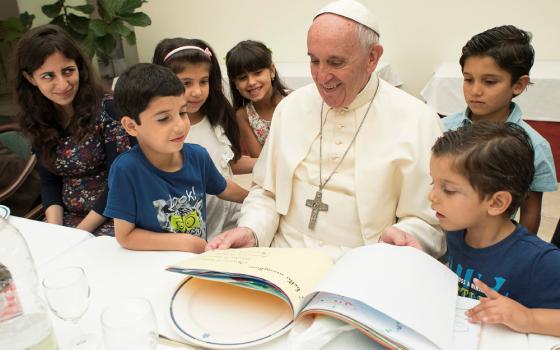Chances are you heard the news about Pope Francis having lunch with Syrian refugees on Thursday, and if you're like many people, you might have wondered what the big deal was. A nice gesture, to be sure, but merely a drop of joy in an ocean of pain.
Or was it?
These were the 21 refugees he brought to Rome in April and June, when they were lifted from the fear and misery of a desperate flight from their war-torn home to a new life of safety and opportunity. But the lunch was also something else — something very important.
It was recognition.
Recognition that these people are human. Recognition that they are not fleeing to Europe to take something away from anyone else or to live off other nations' welfare or to get a free ticket for the American dream.
What they want — what they need — is to live, something that was not possible in Syria. And these small gestures, magnified by the celebrity power of the Holy See, send a clear message to the world, where decisions have to be made on issues such as how many refugees to accept, how to fund resettlement programs, and how to help nations such as Lebanon that have taken far, far more refugees than any other.
Sometimes a lunch is just a lunch. But sometimes, a lunch can remind policymakers — and the citizens who influence them — that policies affect real lives.
'The people here are suffering and dying'
How bad are things in Syria? Just ask the Discalced Carmelite sisters in Aleppo, who have appealed for help from the outside world as government troops have laid siege to the city.
"The bombs are falling all around us, but we are not going to leave the people in their suffering," Sr. Anne-Francoise said, according to Religion News Service. "The people here are suffering and dying."
RNS said government troops have surrounded rebel-held areas of the city, cutting off any hope of supplies, and the fighting has been focused in the area that is home to the convent.
"When the Syrian army attempts to prevent the opposition and other groups from entering the city, the bombing and shelling is really close to us," Sr. Anne-Francoise said. "Thank God, they haven't hit us yet, but we are constantly hearing the shells pass over our heads."
RNS reports that the six nuns have taken in refugees and are supporting others, and they refuse to leave the people they serve.
"By now, it is only the poorest of the people who are still left here in Aleppo. So many Christians have left the city during these years of war," Sr. Anne-Francoise said.
"We have no water, no electricity, and the fighting is continuing incessantly. How can we abandon these people in their suffering? Our presence is important for them."
A model for how to stop violence
Of course, Syria is not the only dangerous place in the world, and it's not the only place where violence has caused many to flee for their lives.
But there is hope.
The New York Times has a feature on a neighborhood in San Pedro Sula, Honduras, where efforts to stop the violence have actually worked. And if they can work there, they can work anywhere:
Three years ago, Honduras had the highest homicide rate in the world. The city of San Pedro Sula had the highest homicide rate in the country. And the Rivera Hernández neighborhood, where 194 people were killed or hacked to death in 2013, had the highest homicide rate in the city.
But not anymore, thanks to a U.S.-funded program that treats crime like a communicable disease and works to change the environment where it festers. That not only makes the area safer, but stems the flow of people fleeing as refugees to the United States.
How does this work? How is it possible that homicides are down 62 percent?
One of the most effective tactics is the creation of neighborhood outreach centers; the United States has sponsored 46 of these. Typically, a church donates the building, and the United States remodels it and provides computers, equipment and initial funds to hire a coordinator. The centers recruit mentors and provide vocational training for residents and help finding jobs for them as barbers, bakers and electricians. ... The United States has provided local leaders with audio speakers for events, tools to clear 10 abandoned soccer fields that had become dumping grounds for bodies, notebooks and school uniforms, and funding to install streetlights and trash cans.
The program is similar to one that has proven effective in Boston and offers yet more proof that fighting the reasons that violence and crime occur — treating the disease, rather than the symptoms — is far more effective than fighting the violence itself.
Don't want your neighbor in your garden? Helping him weed and fertilize may work a lot better than putting up a fence.
Remember, links, tips and accounts of the response to any crisis anywhere in the world are always welcome at [email protected].
[Dan Stockman is national correspondent for Global Sisters Report. Follow him on Twitter or on Facebook.]

